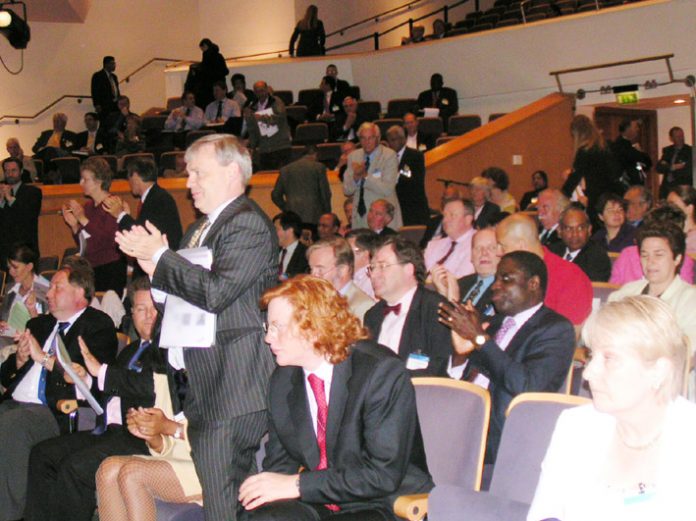
THE British Medical Association (BMA) Annual Representative Meeting in Belfast yesterday rejected selling-off the NHS to private corporations.
It did this when it voted for a rider to Motion 19 from the South Western Regional Forum.
The rider, from Enfield and Haringey Division, stated: ‘These fundamental values cannot be maintained if the NHS is broken up and tendered out to private corporations.’
The rider was carried overwhelmingly on a show of hands.
With the rider, the resolution states: ‘That this Meeting believes that the National Health Service can and should be:
‘(i) free at the point of access;
‘(ii) ethically rationed by clinical priority without discriminatory values;
‘(iii) equitably resourced;
‘(iv) funded out of general taxation.
‘These fundamental values cannot be maintained if the NHS is broken up and tendered out to private corporations.’
Moving the rider, Mrs Anna Athow, consultant surgeon from north London, said: ‘In 1948 health care in Britain was revolutionised by the advent of the National Health Service. It was a great step forward.
‘Hospitals were nationalised, hospital doctors became salaried.
‘A special contract was made with GPs that, in return for public funding, they provided care for NHS patients without charge.
‘Local authority community services were brought in with primary and secondary care, to make one whole, publicly-funded and essentially publicly-provided service.
‘Funding was by taxation and redistributed according to clinical need.
‘The large size of the risk pool enabled cross-subsidisation of the more complex cases by the fitter patients.
‘At one stroke it became possible to provide universal access and equality of care, including specialist care, free at the point of use.
‘Fear of falling ill was lifted for the poor.
‘The rider makes clear that NHS provision is on the basis of clinical priority and that this is not achievable if private healthcare corporations provide the service.
‘We have seen them in action in the private treatment centres.
‘They skim out the straightforward cases and discriminate against patients with co-morbidity or complexity, who are dumped back on the NHS.
‘The NHS functions as a whole, integrated system. It must be protected as such.
‘Once chunks are removed for profit, the whole system comes apart and equality, service free at the point of use and universal access will be destroyed.
‘We have to make sure that the big private corporations are kept out of our NHS.’
In the afternoon delegates voted by a majority for Motion 162, condemning the BMA leadership for ‘failing patients and the profession’.
Motion 162, Islington Division, in the section of the debate on BMA strategy, stated: ‘That this Meeting believes that the current BMA leadership has failed patients, the profession and the country by their failure to actively oppose the current wave of organisational and financial reforms, which are destabilising the NHS.
‘This Meeting believes that the current policy of exposure of policy defects is not powerful enough and insists that it is replaced by a policy of active opposition and proper scrutiny.’
The chairman, Dr Michael Wilks, went straight to an electronic vote on the motion, without a show of hands, following a debate.
The result was 58 per cent for the motion and 42 per cent against.
The mover of the motion, Dr Natasha Arnold, from Islington, in her reply to the debate, said: ‘There is a consensus between us and the BMA. We are against the reforms which are destabilising the NHS.’
She added: ‘But there has to be a bottom line.
‘We can’t carry on saying negotiations can and do work, there’s no reason to believe they do so.’
Seconding the motion, Hamish Brown, a consultant surgeon, said: ‘The unchallenging nature of the BMA response has painted us as supporting the reforms.
‘Paul Miller gave a sterling address to the seniors’ conference.
‘I emailed it to all 180 consultants in my Trust. The responses were all the same: great stuff, it’s about time someone from the BMA said these things.’
He added: ‘It is time for us to actively and vocally oppose the disastrous direction this government is taking the NHS.’
James Johnson, chair of the BMA General Council, opposed the motion.
He told the Meeting: ‘We have to talk to the government.
‘We can’t just go and say: “We want you to change policies.’’
‘All that would happen is the door would be shut.
‘We have to keep on talking. We must go on influencing the government.’